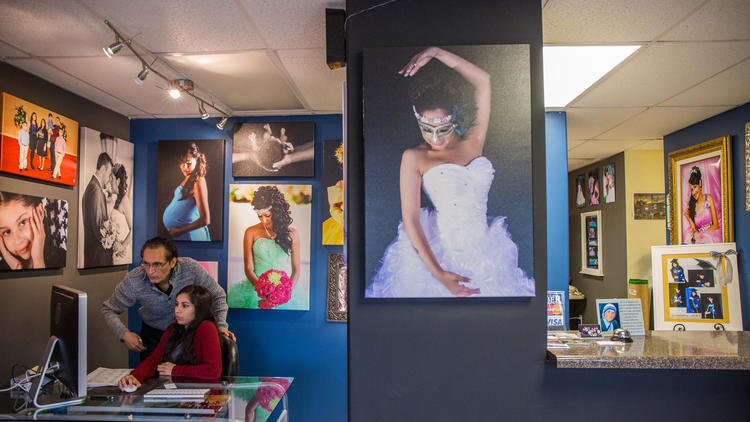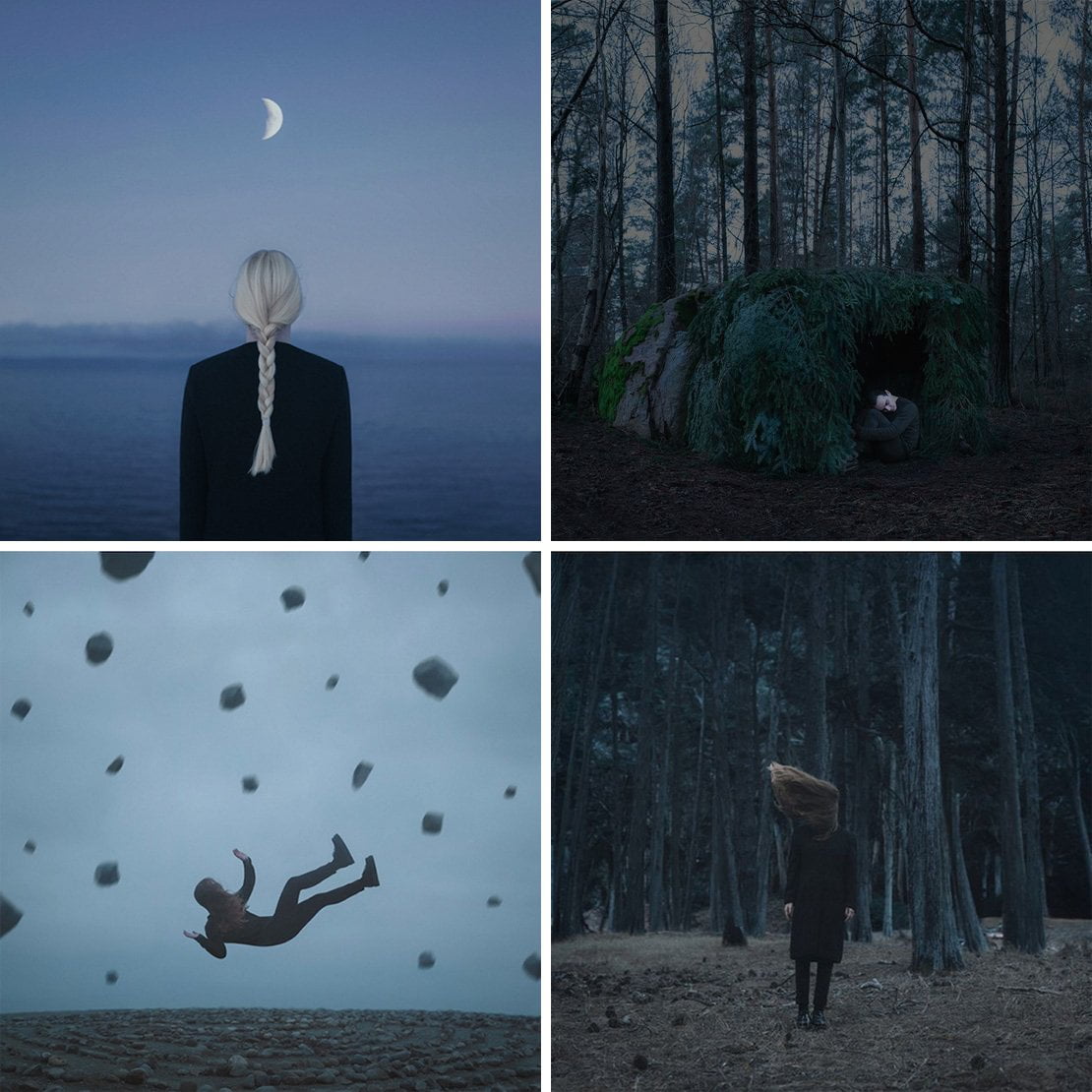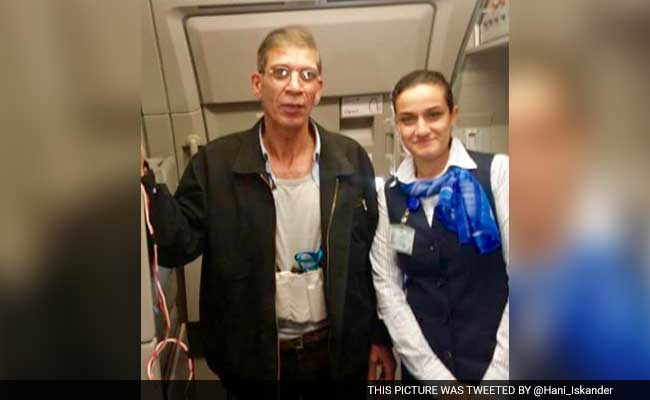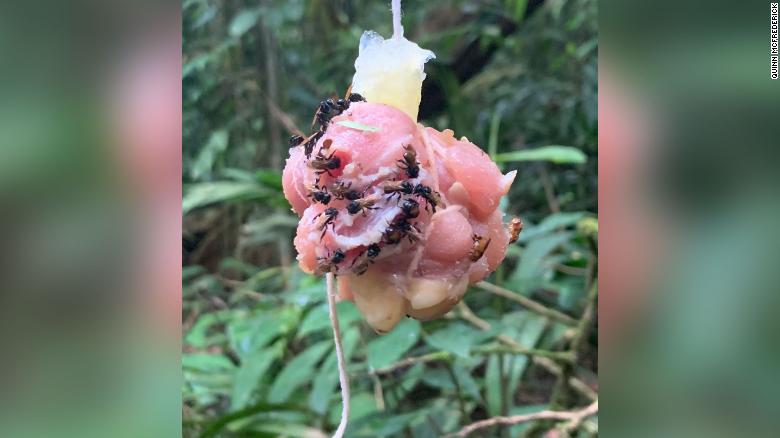
The two missiles hit, seconds apart, at the University of Aleppo, where recent graduate Mariela Shaker had stopped by to pick up her business school transcripts.
Emergency vehicle sirens screamed as rescue workers searched for survivors. Huge plumes of smoke billowed from the buildings that were struck. Shaker ran blindly, searching for friends. She trembled, fearing more explosions were on the way.
Those panicked moments cemented her determination to flee Syria and its brutal civil war.
“It’s like you see blood everywhere,” she said during recent interviews in Chicago, recalling the January 2013 blasts that killed more than 80 people. “Everything turned to black that day. … The university turned into a slaughterhouse.”
The next day the gifted violinist received a lifeline in the form of an email from an associate dean at Monmouth College, a tiny liberal arts school in western Illinois. One of the first U.S. colleges to join an international effort to aid Syrian students, Monmouth ultimately gave Shaker a partial scholarship to pursue a second bachelor’s degree, this one aligned with her passion: music. As part of the same program, she is now on scholarship to study for a master’s in music performance at DePaul University.
But the 25-year-old grad student hasn’t forgotten the plight of fellow Syrians trapped in a war with no end in sight. She works to heighten awareness of the suffering in Syria by speaking and performing at fundraising and educational events, including appearances this past year on a White House panel and at a United Nations-sponsored concert at the Kennedy Center in Washington, D.C.
Friends and teachers say her journey stands as a counterpoint to rising sentiment against admitting more Syrian refugees to the United States, a view stoked by the terrorist attacks last fall in Paris.
“We’re in a period, kind of xenophobic, when people are saying, ‘We can’t let these people in,’ ” said Carolyn Suda, director of Monmouth’s chamber orchestra and a mentor to Shaker. “She’s a model for people to realize that these are not scary people.”
While many observers agree the vast majority of Syrian and Iraqi refugees pose no security risk, concerns persist that militants can infiltrate the ranks of migrants and get into Europe and the U.S. undetected. A hotly debated House bill to intensify screening was blocked this week in the Senate.
Aleppo is now a city divided, its territory split between government forces and Islamist rebel groups. The devastation is vast — an estimated 25,000 people have been killed, Aleppo’s historic center lies in ruins, and nearly a third of its former population of 3 million has fled.
Shaker’s parents, however, remain in Aleppo. She calls most every day and checks Facebook daily for any news from home.
“I’m just afraid one day I’m going to see … something happens to my parents,” she said on a recent wintry afternoon. “I would love for them to be in a safer place and to be able to see them.”
During Shaker’s childhood, Aleppo was a bustling commercial hub with roots in antiquity — its walled Old City home to a maze-like bazaar dating to the Silk Road era and the Umayyad mosque, one of the world’s oldest and largest.
Her father, a high school English teacher, and her mother, a medical lab assistant, shuttled Shaker and her older brother, Karam, to basketball and swimming lessons, computer classes and music instruction, Scouts and Assyrian Orthodox church choir.
“Life used to be really peaceful and everything was good,” Shaker’s mom, Salwa, said during a phone interview from the family’s apartment in Aleppo, which is now without electricity or water. Since the civil war spread into Aleppo in 2012, the building has been damaged by bombs three times — attacks that shattered windows and blew out doors.
The war has buffeted Shaker in myriad ways. In 2012, she lost the chance to pursue a master’s at the Trinity Laban Conservatory of Music and Dance in London because an exam she needed for graduation from the University of Aleppo was repeatedly delayed due to the conflict. She spent the next year teaching violin to schoolchildren at the Arabic Institute of Music, diving under tables with her students when bombs hit nearby.
“It’s really, really close,” she remembers, describing how near the bombs fell. “You don’t know what’s going on. You just hear voices and terrible things from everywhere.”
When she wasn’t teaching, she dashed from one Internet cafe to another, trying to find a place with a working Internet connection so she could fire off applications for master’s programs in Europe and the U.S.
Monmouth and DePaul caught her eye because they were part of an Institute of International Education consortium launched in 2012 to aid Syrian students. The Illinois Institute of Technology helped form the consortium, and Illinois State University belongs as well.
“Chicago, especially, has been a safe-haven city for Syrian students and scholars,” said Daniel Obst, an IIE administrator.
The Monmouth associate dean helped Shaker navigate the application process. But even with a large share of her tuition covered, the costs for her remaining tuition, room and board, transportation and books kept the opportunity out of reach for Shaker, whose parents no longer had jobs.
“My family could not help me with even $1,” she said.
Shaker scoured the Internet and came across an organization that helps Syrian students. She submitted a request for help but did not hear back right away. So she checked out the group’s website, found a list of its donors and Googled each one. That yielded a wealthy Arab businessman with a Facebook page who had a couple of Facebook friends shared with Shaker. She contacted the businessman and ultimately persuaded him to contribute $7,000 toward her first year of school. She also tracked down aid from two organizations to cover the rest of her costs.
“I worked like a spider,” she said, perched on the edge of her bed in the modest bedroom she rents from a family in East Rogers Park. “I’m telling you this in 15 minutes, but it took me five to six months to manage all of it.”
Shaker left Syria in July 2013. At first, it looked as if the only way out was a notorious pathway between the divided halves of the city. The winding route, a target for snipers, was known as the “passage of death.”
“I told my mom, ‘No, I can’t leave. I can’t risk it for you to take me on this road,” Shaker said. They waited 24 hours, then found a bus that would take passengers on a circuitous road to Lebanon.
Shaker, her mother and her brother waited three hours for the bus. The driver told them he could take them to Beirut, but at their own risk. Because they are Christians, they would be likely targets if the bus encountered extremists. So, Shaker and her mother wore hijabs, or Islamic head coverings, and took no food or water along because it was Ramadan, the Islamic holy month when Muslims fast.
What would be a seven-hour drive on a direct route became a 17-hour, meandering trek through desert terrain, with stops at dozens of checkpoints. At every checkpoint, police searched Shaker’s violin case. At one point, the driver got lost and the bus sat in the desert sun for several hours. “We were afraid random people would come and do something to us,” Shaker said.
Shaker got out safely. Three days later buses on the same route were attacked by snipers. “A lot of civilians, people I know, they were just killed,” Shaker said.
Shaker made her flight to the U.S. Her brother stayed in Lebanon, ultimately making it to Europe after Mariela sent money she earned performing so he could pay a smuggler to ferry him to Greece.
“The wind was blowing so hard when he was in the sea, and the boat filled with water,” Mariela Shaker said. “We knew it was going to be really dangerous, but Syria was not going to be any better. … At least there will be a chance for a new life.” Her brother is now among refugees living in a camp in the Netherlands.
Shaker’s mother returned to Aleppo, where she and her husband rarely leave their apartment except to find food and water. “Getting a visa to anywhere is very difficult, if not impossible, so they don’t have a chance,” Shaker said. “It’s hard. If they leave, someone would come take over their place, and they’ve been working 30 years to own our house.”
Recalling what her mindset was as she escorted her children out of Syria, Salwa Shaker began to cry. “I was hoping to make it safely to Lebanon,” she said, “and to make my children’s dreams a reality.”
Mariela Shaker’s dream today is to become a violin soloist and to open a music school for Syrian refugee children.
“I’m not going to sugarcoat it,” said Judy Bundra, interim dean of DePaul’s School of Music. “She’s not coming from the New Trier High School orchestra program and having a private teacher who plays in the Chicago Symphony Orchestra. We’re here to teach her, to fill in the gaps. She’s on a journey of improving her skills.”
At a recent rehearsal of the DePaul Concert Orchestra, Shaker and the other students practiced a portion of Verdi’s Four Sacred Pieces, sending purling waves of music over the wooden pews in the former chapel that serves as a concert hall.
“This hymn is about the Virgin Mary watching her son be executed — it is the saddest thing in history,” orchestra director Michael Lewanski told the students. “It’s not just about Jesus and Mary. It’s about us.”
Shaker swayed slightly as she and the rest of the orchestra played the passage again. She quietly tapped her sneaker-clad foot to the music as the late afternoon sunlight faded.
“When you perform a piece … you try to put all your feeling into the music you are playing,” she said during interviews. “I feel it’s a holy relationship between my violin and me.”
It’s a relationship that Shaker, who has been granted asylum, is beginning to share widely.
With her fiance, a Syrian pianist now based in London, she performed at a U.N. concert at the Kennedy Center in June. Five days later, she spoke on a panel at the White House, where she was honored as a “champion of change” on refugee issues.
“Although I feel powerless to change the current situation in Syria politically and socially, I am committed to the power of music and I believe in its ability to fashion peace and love in this world,” she said during the panel discussion.
Next month she will perform for an Islamic civil rights group in Chicago. “I will talk about how we are attached together in Syria,” Shaker said. “We are not able to live if we are not together.”
[Source:- Chicago Tribune ]












